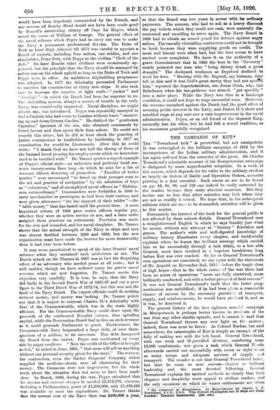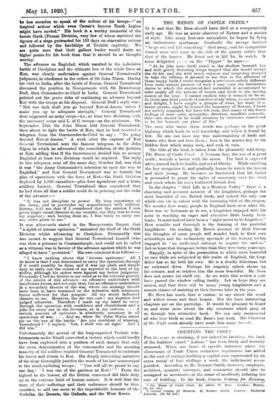THE CAMPAIGN OF KUT.*
THE "Townshend luck" Is proverbial, but not omnipotent. It was outweighed in the brilliant campaign of 1915 by the
incompetence of the Indian military administration, and it has again suffered from the corrector of the press. Sir Charles Townshend's admirable account of his Mesopotamian campaign Is disfigured by some unpardonable misprints. In a work of this nature, which depends for its value to the military student so largely on Orders of Battle and Operation Orders, accurate printing is a first essential. Such errors as are to be found on pp. 42, 86, 99, and 138 can indeed be easily corrected by the reader, because they make absolute nonsense. But they incline one to fear that other mistakes may lurk where they are not so readily d_tected. We hope that, in the subsequent editions which are em e to be demanded, attention will be given to this matter.
Fortunately the interest of the book for the general public is not affected by these minute details. General Townshend uses a straightforward English in which he says frankly just what he means, without any attempt at " literary " flourishes and graces. The author's wide and well-digested knowledge of military history illuminates every chapter, and incidentally explains where he learnt the brilliant strategy which carried him so far successfully through a task which, to a less able General, must have resulted in a hopeless breakdown long before Kut was ever reached. So far as General Townshend's own operations are concerned, we can agree with the statement of Mr. Asquith on November 2nd, 1915—before the tragic close of high hopes—that in the whole course of the war there had been no series of operations "more carefully contrived, more brilliantly conducted, and with a better prospect of final success." It was not General Townshend's fault that the latter prog- nostication was unfulfilled ; if he had been given a reasonable chance of success by the necessary provisica of transport, supply, and reinforcements, he would have attlined it, and, as it was, he deserved it.
The general history of the first eighteen months' campaign in Mesopotamia. is perhaps better known to students of the war than any other similar episode, and it cannot be said that General Townshend throws any new light on the matter ; indeed, there was none to throw. As Colonel Buchan has said somewhere, the catastrophe of Kut is simply an example of the folly of making war with the left hand. General Townshend, with one weak and ill-provided division, numbering some 13,000 combatants, was given a task which General Maude afterwards carried out successfully with seven or eight times as many troops and adequate services of supply and transport. The wonder is not that General Townshend
but that he came so near success—thanks to brilliant leadership and the most devoted following. Geeeral Townshend explains his tactical methods so clearly that their elegance and simplicity must appeal to civilian readers, and the only occasions on which he waxes enthusiastic are when • My Campaign in Mesopotamia. By Major-General Sir Charles V. F. Townshend. K.C.B., D.8.0. With Portrait Frontispiece and a Maps and Plans. London: Thornton Bunenrorth. [28B. net.]
he has occasion to speak of the ardour of his troops—" an Inspired ardour which even Caesar's famous Tenth Legion might have envied." His book is a worthy memorial of the heroic Sixth (Poona) Division, very few of whom survived the rigours of a siege protracted for 153 days on starvation rations and followed by the hardships of Turkish captivity. We are quite sure that their gallant leader would desire no higher praise for his book than that it should be so thought worthy.
The advance on Baghdad, which resulted in the indecisive battle of Ctesiphon and the ultimate loss of the whole force at Kut, was clearly undertaken against General Townshend's judgment, in obedience to the orders of Sir John Nixon. During his visit to India, after the battle of Kurna, General Townshend discussed the position in Mesopotamia with Sir Beauchamp Duff, then Commander-in-Chief in India. General Townshend pointed out the grave risks of continuing an advance beyond Kut with the troops at his disposal. General Duffs reply was : "Not one inch shall you go beyond Kut-al-Amara unless I make you up to adequate strength." General Townshend then suggested an army corps—i.e., at least two divisions, with the necessary corps and L. of C. troops—as the minimum. On September 25th Sir John Nixon told General Townshend, then about to fight the battle of Kut, that he had received a telegram from the Commander-in-Chief to say : "No going beyond Kut-al-Amara." A week after the capture of Kut General Townshend sent the famous telegram to Sir John Nizon in which he advocated the consolidation of the position at Kut, adding that if the Government desired him to occupy Baghdad at least two divisions would be required. The reply to this telegram, sent off the same day, October 3rd, was that It was "the Army Commander's intention to open the way to Baghdad," and that General Townshend was to furnish his plan of operations with the force at Kut—the Sixth Division depleted by 1,500 casualties—plus four squadrons and a horse artillery battery. General Townshend then considered that he had done all that a soldier could do in pointing out the risks of the advance :—
"It was not discipline to protest. My long experience of the Army, and in particular my acquaintance with military history, told me that if I considered that the mission I was given might entail disaster to my country, my duty was to warn my superior ; and, having done so, I was ready to carry out any order given to me."
It was afterwards stated in the Mesopotamia Report that "a spirit of intense optimism" animated the Staff of the Sixth Division whilst advancing to Ctesiphon. Presumably this was meant to suggest that General Townshend himself (who was then a prisoner in Constantinople, and could not be called as a witness) was in favour of the advance against which he was alleged to have "protested." His own comment is as follows :— " I know nothing about this 'intense optimism.' All I do know is that I was determined to carry the operation through if it could possibly be done, and it was my plain and simple duty to carry out the orders of my superior to the best of my abihty, although his orders were against my better judgment. Personally I had no doubts in my mind as to the extreme gravity of the results of this advance—an offensive undertaken with Insufficient forces, and not only that, but an offensive undertaken In a secondary theatra of the war, where our strategy should have been to have remained on the defensive with minimum forces sufficient for that purpose. All my study indicated disaster to me. However, the die was cast ; my superior had judged otherwise. Therefore I made up my mind to carry through the operation with confidence and cheerfulness and a joke for every one in the bivouacs, as is my custom. . . . A eertain amount of optimism is absolutely necessary in all operations of war. . . . And so, when Sir John Nixon asked me on the eve of the battle, 'Are you confident of winning, Townshend ? ' I replied, Yes, I shall win all right.' And I did win."
Unfortunately the arrival of the long-expected Turkish rein- forcements under Khalil converted a victory which could hardly have been exploited into a position of such danger that only the stern determination of the commander and the amazing tenacity of the soldiers enabled General Townshend to extricate his forces and return to Kut. His deeply interesting narrative of the siege thoroughly justifies the words of his last communiqué to the much-enduring troops : "You will all be proud to say one day : I was one of the garrison at Kut I'" From the highest to the lowest, all the British concerned did their duty up to the extreme limit of human nature. It is well that the dory of their sufferings and their endurance should be thus recorded, to add one more to the imperishable honoura of the Norfolk& the Dorset& the Ckdazds, and the West Bente.











































 Previous page
Previous page